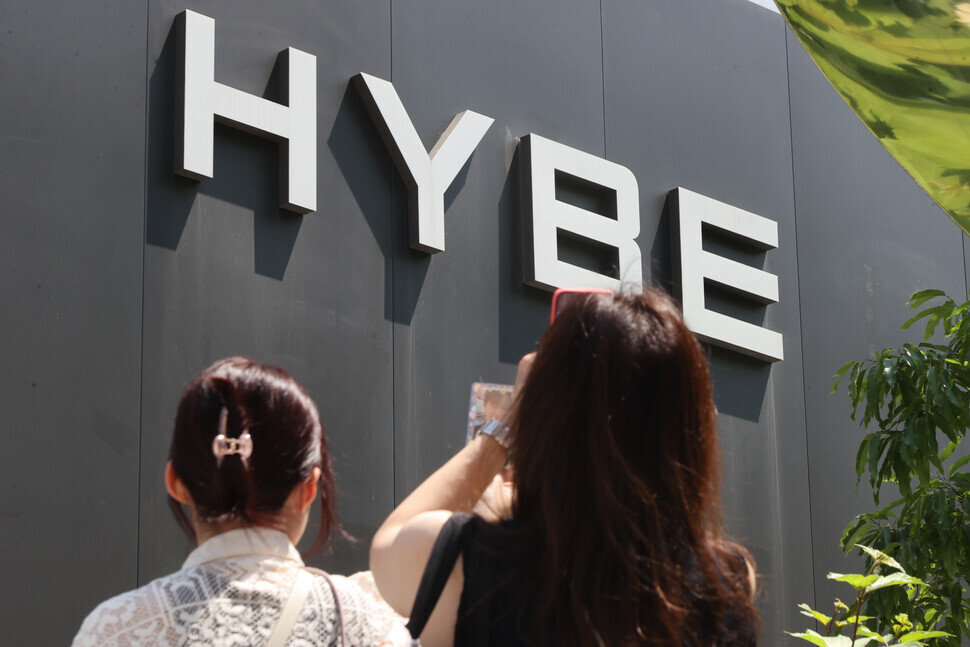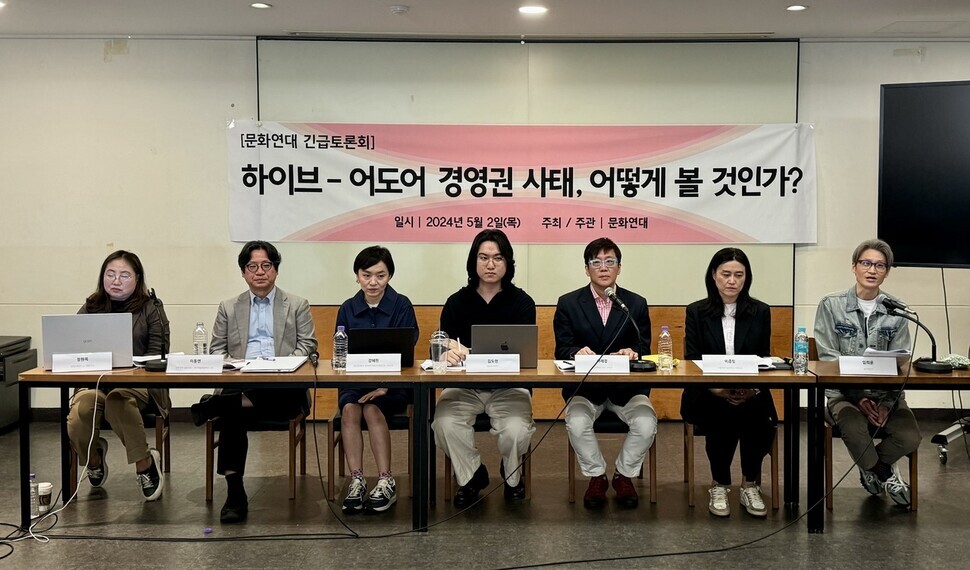hankyoreh
Links to other country sites 다른 나라 사이트 링크
Hybe-Ador dispute shines light on pervasive issues behind K-pop’s tidy facade

As the feud between Hybe and Ador CEO Min Hee-jin intensifies, many are taking the conflict as an opportunity to shed light on K-pop’s underbelly.
One such endeavor was organized by activist group Cultural Action, which hosted a panel discussion on the Hybe-Ador feud at the St. Franciscan Education Center in Seoul on Thursday.
“The problem that’s surfaced from the dispute is not the multi-label system, but rather the vertical power structure presided over by Hybe, which exercises exclusive control over content. This prevents the various labels in the Hybe umbrella from being able to exercise any creative authority,” said Lee Dong-yeun, a professor at the Korea National University of Arts who serves as the executive director of Cultural Action.
“The longer the dispute continues, the more the artists suffer. This includes NewJeans, whose members are waiting for their return to the stage, and other artists under Hybe’s various labels. It’s also the fans who take the fallout. Whether it’s the fans of Illit or NewJeans, the people who take joy from the labels’ content creation are left on standby,” Lee said.
“The dispute forces us to ask questions about what we need to change, the problems we need to solve, to create a sustainable environment for the K-pop industry,” Lee added.
“Min Hee-jin’s press conference shed light on the dark realities of K-pop consumption that we’ve been ignoring. Many people online have jumped in to express their agreement with Min’s statements,” said Kim Do-heon, a cultural critic.
“The labels set things up to encourage excessive consumption among fans, such as non-stop streaming and fervent album sales. The practice of using album sales to increase profits is creating imbalances and burdens in the K-pop market,” said Kim.
Kim noted how Min had mentioned practices like inflating album sales by putting photo cards in albums, thus requiring fans to buy more to get the photo cards they want.
“The practice of encouraging fans to compete among themselves for products is something that needs to be addressed,” Kim said.
“Hybe is an industry leader, so they have that much greater of a responsibility to address industry-wide issues,” Kim added.
“K-pop fans are slowly getting tired of competing with each other and fighting for limited-edition products,” said Kang Hye-won, a guest professor at Sungkyunkwan University.
“We need a greater spectrum of standards for evaluating K-pop content that goes beyond early album sales, Billboard rankings, and what’s trending on social media,” said Kang.
“BTS sparked the K-pop industry’s version of the Miracle on the Han River [South Korea’s postwar economic development], which has uplifted Korea’s international image. However, this success has hidden the problematic, unhealthy practices within the industry, which continue to persist,” said Lim Hee-yun, a cultural critic.
“The important issue in the Hybe-Ador dispute isn’t the question of who’s good and who’s bad. It’s about how underlying issues in the industry are finally coming to the surface. We all need to work together to address these issues,” Lee said.

Additionally, some are pointing out the issues that are being ignored in the Hybe-Ador spat.
“Both sides claim to be the protectors of the artist, but nobody seems to be paying attention to the actual members of groups like NewJeans, Le Sserafim, and Illit — the actual laborers behind K-pop — and how they feel,” said Kim Do-heon.
“These people are more than just singers or members of an idol group. They are the artists who devote themselves to the agencies’ projects, to perfecting the finalized vision that is presented onstage. We are seeing no respect or consideration for them,” he said.
“There is a considerable amount of responsibility on Hybe, which should have solved its dispute with Min through internal audits and reviews, but opted for a public smear campaign. Min, on the other hand, used inappropriate language in a public press conference, during which she repeatedly projected her own interests and thoughts on the members of NewJeans. Neither party is acting appropriately,” Kim added.
By Suh Jung-min, staff reporter
Please direct questions or comments to [english@hani.co.kr]

Editorial・opinion
![[Editorial] Intensifying US-China rivalry means Seoul must address uncertainty with Beijing sooner than later [Editorial] Intensifying US-China rivalry means Seoul must address uncertainty with Beijing sooner than later](https://flexible.img.hani.co.kr/flexible/normal/500/300/imgdb/original/2024/0517/8117159322045222.jpg) [Editorial] Intensifying US-China rivalry means Seoul must address uncertainty with Beijing sooner than later
[Editorial] Intensifying US-China rivalry means Seoul must address uncertainty with Beijing sooner than later![[Column] When ‘fairness’ means hate and violence [Column] When ‘fairness’ means hate and violence](https://flexible.img.hani.co.kr/flexible/normal/500/300/imgdb/original/2024/0516/7417158465908824.jpg) [Column] When ‘fairness’ means hate and violence
[Column] When ‘fairness’ means hate and violence- [Editorial] Yoon must stop abusing authority to shield himself from investigation
- [Column] US troop withdrawal from Korea could be the Acheson Line all over
- [Column] How to win back readers who’ve turned to YouTube for news
- [Column] Welcome to the president’s pity party
- [Editorial] Korea must respond firmly to Japan’s attempt to usurp Line
- [Editorial] Transfers of prosecutors investigating Korea’s first lady send chilling message
- [Column] Will Seoul’s ties with Moscow really recover on their own?
- [Column] Samsung’s ‘lost decade’ and Lee Jae-yong’s mismatched chopsticks
Most viewed articles
- 1[Editorial] Transfers of prosecutors investigating Korea’s first lady send chilling message
- 2[Exclusive] Unearthed memo suggests Gwangju Uprising missing may have been cremated
- 3[Column] US troop withdrawal from Korea could be the Acheson Line all over
- 4[Editorial] Intensifying US-China rivalry means Seoul must address uncertainty with Beijing sooner t
- 5Xi, Putin ‘oppose acts of military intimidation’ against N. Korea by US in joint statement
- 6[Column] When ‘fairness’ means hate and violence
- 7‘Shot, stabbed, piled on a truck’: Mystery of missing dead at Gwangju Prison
- 8China calls US tariffs ‘madness,’ warns of full-on trade conflict
- 9Seoul government announces comprehensive measures to prevent lonely deaths
- 10Records show how America stood back and watched as Gwangju was martyred for Korean democracy